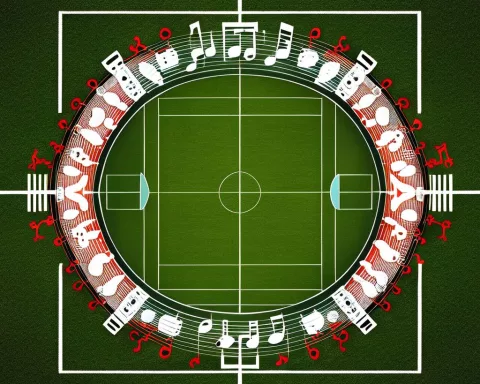Kaizer Chiefs, a once dominant soccer team in South Africa, is experiencing a decade-long decline without any significant trophies. This has caused worry among fans and former players like Lucas Radebe, who played for the team from 1989 to 1994. The club’s struggles are not just about missing silverware, but they also highlight the deteriorating condition of the club. Radebe’s concerns are a reminder of the club’s unrealized potential and a call for them to return to their former glory.
What is the current state of Kaizer Chiefs in South African football?
Kaizer Chiefs, a once mighty force in South African football, is currently experiencing a period of decline. The team has spent nearly a decade without securing any significant trophies, causing dismay among fans and former players like Lucas Radebe. The club’s struggles are not only about the missing silverware but also a glaring sign of its deteriorated condition. The worries voiced by its former players are a reminder of the club’s unrealized potential and a call for the club to assess its situation to return to its former glory.
The Slow Decline of Kaizer Chiefs
The iconic South African football team, Kaizer Chiefs, known for its rich legacy and numerous victories, is currently experiencing a troubling period of decline. Lucas Radebe, an ex-player and esteemed figure of the club, has publicly shared his apprehensions regarding the club’s present situation.
Radebe, who proudly wore the Amakhosi jersey from 1989 to 1994, is deeply troubled by the fading dominance of this once-mighty force in South African football. In an unprecedented event in its history, the club has spent nearly a decade without securing any significant trophies.
Not winning any silverware isn’t merely a statistical anomaly for the club; it’s a direct blow to its identity. For decades, Kaizer Chiefs has been a symbol of success, a football titan that frequently celebrated trophy victories. However, the recent trophy drought has been a significant setback, causing dismay among many, including Radebe himself.
Kaizer Chiefs: A Fall From Grace
Radebe voiced his worries, saying, “As a former player, I understand the magnitude of the brand and to see it without a trophy for ten years is disconcerting. It’s alarming to see such a powerful club plummet like this.”
The diminished performance of Kaizer Chiefs isn’t limited to the league alone. The team was also ousted from the Nedbank Cup at the hands of Milford FC, proving that the slump has affected all aspects of their performance. Radebe contends that the lack of victories is not only about the missing silverware but also a glaring sign of the club’s deteriorated condition.
Radebe continues, “The club’s current situation reveals the issues plaguing its performance. There’s a lot happening behind the scenes that isn’t visible, which is a major concern.”
Reflections on Past Victories
Rewinding to the 1980s, the Amakhosi enjoyed a golden age, clinching nearly every available trophy. From 1980 to 1989, the Glamour Boys, as they were fondly called, collected over 20 trophies, including three league titles. Radebe himself was instrumental during this time, helping the Soweto titans secure the league title three times.
Radebe’s departure in 1994 didn’t immediately disrupt the club’s winning streak, as they continued to triumph in the Premier Soccer League (PSL) era. However, the recent barren spell suggests that the changes within the club may have had unexpected adverse effects.
Radebe’s worries are echoed by several other former Kaizer Chiefs players. These collective concerns emphasize a significant departure from the club’s glorious past.
A Call to Action
It’s clear that the club is currently facing a critical juncture. The once formidable team, a titan in South African football, is now grappling to recover its form. The club’s current state is not only a concern for its ex-players or fans, but it also signifies a fundamental shift in the South African football scene.
Radebe’s concerns transcend the nostalgia of past victories. They are a plea for introspection and a call for the club to assess its situation to return to its former glory. For a team as historically successful as the Kaizer Chiefs, the current state presents a challenge that requires thoughtful consideration and strategy.
Radebe and his fellow ex-players’ concerns underscore the club’s struggles, but they also mirror their enduring affection for the club. Their sentiments act as a reminder of the club’s unrealized potential, a potential that was harnessed in the past and can be reignited.
To conclude, the tale of Kaizer Chiefs extends beyond the boundaries of a football club. It stands as a symbol integral to South African football. Its victories over the years are not merely team achievements; they are a testament to the tenacity and spirit of South African football. The worries voiced by its former players are not mere criticisms; they embody hope and faith in the club’s ability to reclaim its past glory.
1. What is the current state of Kaizer Chiefs in South African football?
Kaizer Chiefs is currently experiencing a period of decline, having spent nearly a decade without securing any significant trophies. This has caused concerns among fans and former players, with worries voiced about the club’s deteriorating condition.
2. Why is the current state of Kaizer Chiefs concerning?
The lack of trophy wins isn’t just a statistical anomaly, but it’s also a direct blow to the club’s identity. Kaizer Chiefs has been a symbol of success for decades, and the recent trophy drought has significantly set it back.
3. What is the cause of Kaizer Chiefs’ decline?
According to former player Lucas Radebe, the issues plaguing the club’s performance are happening behind the scenes and aren’t visible. The lack of victories is not only about the missing silverware but is also a glaring sign of the club’s deteriorated condition.
4. What was Kaizer Chiefs’ golden age, and what happened during that period?
During the 1980s, the Amakhosi enjoyed a golden age, clinching almost every available trophy. From 1980 to 1989, the Glamour Boys collected over 20 trophies, including three league titles. Lucas Radebe was instrumental during this time, helping the Soweto titans secure the league title three times.
5. What are the concerns of former Kaizer Chiefs players?
Lucas Radebe and several other former Kaizer Chiefs players have voiced their worries about the club’s current state. These collective concerns emphasize a significant departure from the club’s glorious past.
6. What is the call to action for Kaizer Chiefs?
Lucas Radebe’s concerns are a plea for introspection and a call for the club to assess its situation to return to its former glory. The club’s current state presents a challenge that requires thoughtful consideration and strategy.












